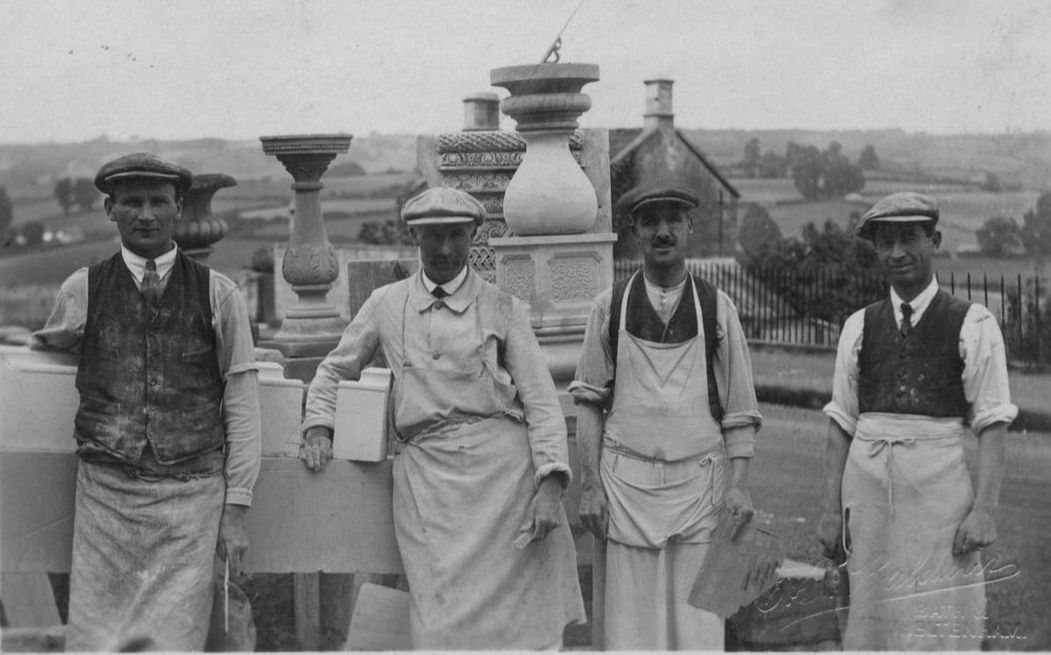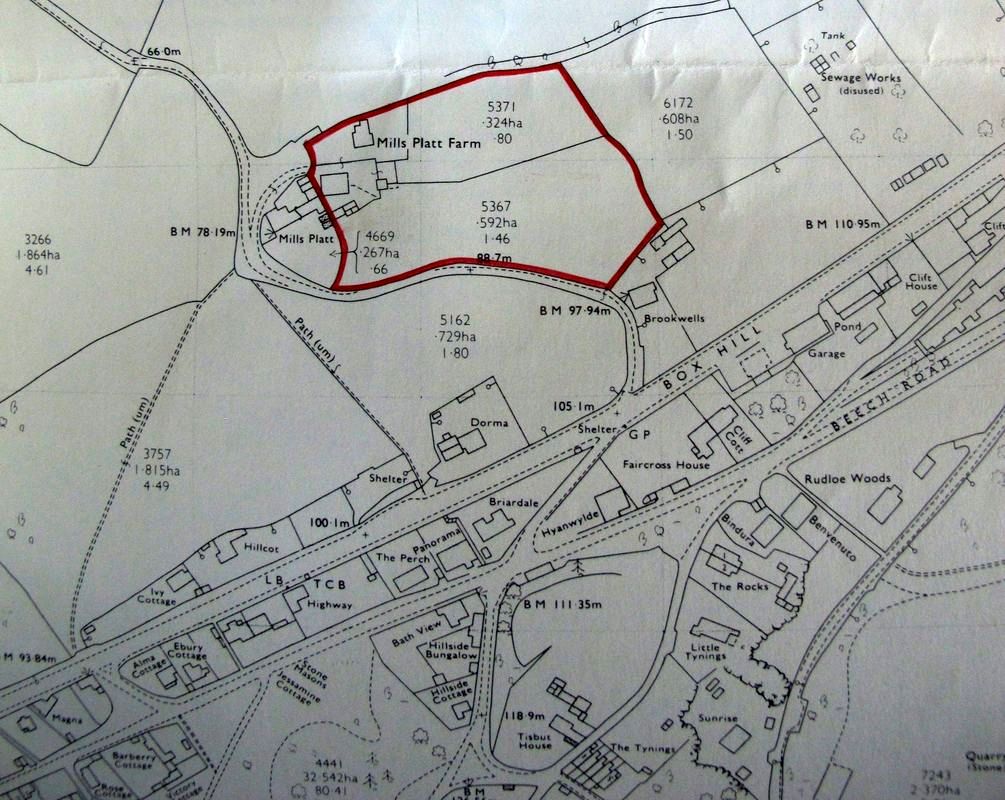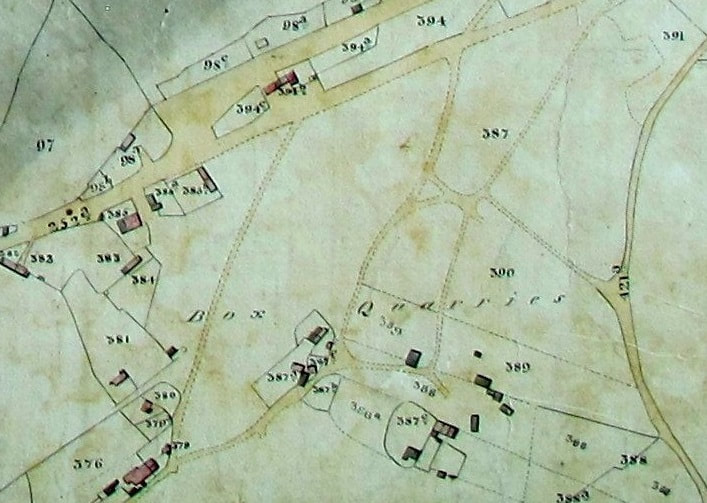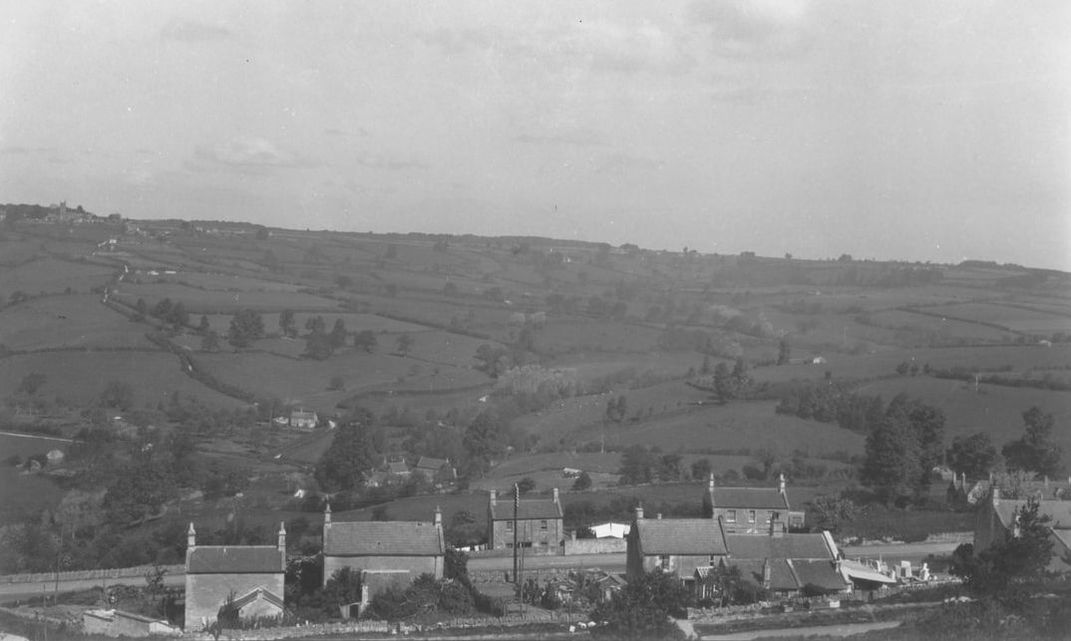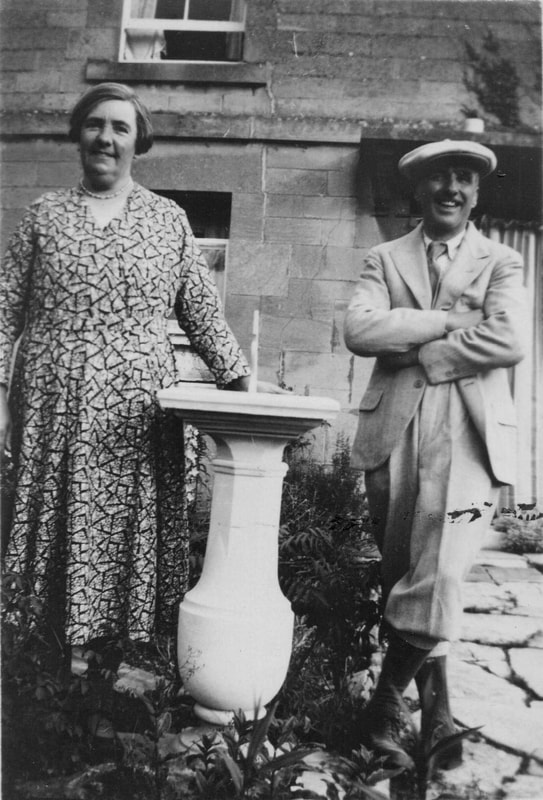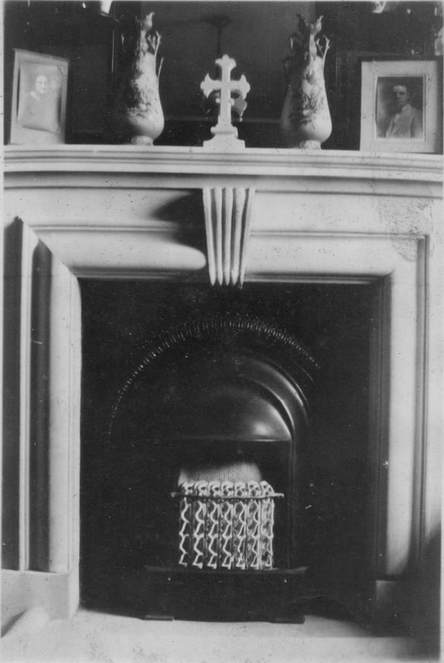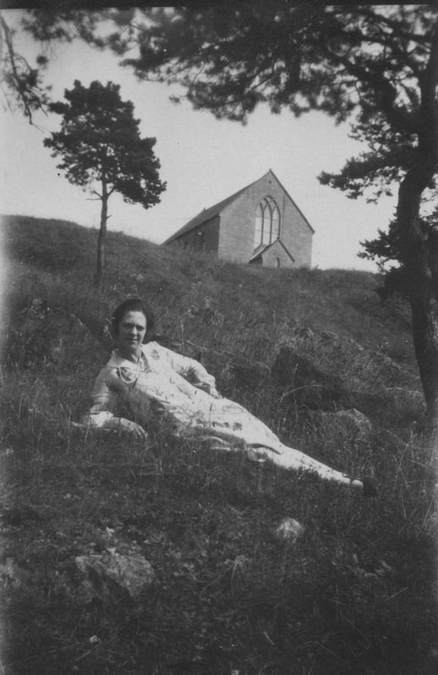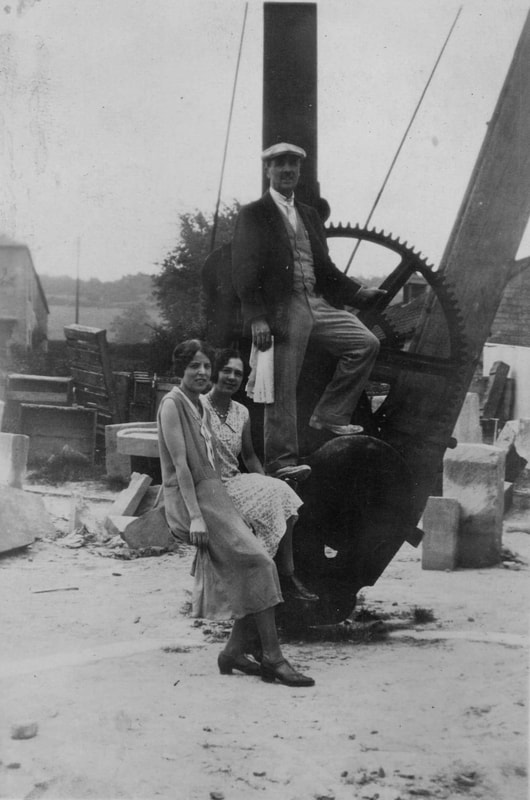|
Alma Cottage, Box Hill Helen Marsili (nee Cogswell) Photos Helen Marsili September 2017 On 23 April 1870 Job Pillinger, mason of Box, Wilts, sold to George Pillinger, also a mason of Box, for £16, a parcel of Garden Ground containing 16 perches (quarter of an acre). The plot was situated about the middle of Box Hill nearly opposite the Rising Sun Inn, facing the High Road from Chippenham to Bath. |
Included in the sale were the dwelling house and other erections, recently occupied by Job Pillinger, which we now know as Alma Cottage. The deed went on to mention a curious prohibition: And the said George Pillinger doth hereby declare that his widow (if any) shall not be entitled in or out of the said land or any part of it.[1]
Pillinger Family of Box Quarries
The Pillinger family had worked in the quarry trade at Box Hill from the early 1800s, including Joseph, who was born in 1781. They were stone masons long before the railway tunnel discovered seams of stone deep in the heart of the hill and they were local people, born and bred in Box Hill for at least four generations. Life was tough and isolated for the residents on Box Hill and Joseph was still working as a mason labourer in 1851, aged 74 years.
Joseph's sons, James and Job, lived close to their father on Box Hill, James as a carpenter journeyman and Job as a mason.
James' wife Hannah and his older daughter Caroline took in laundry and the younger daughter Charlotte became a school mistress. Job and his second wife Hester were still living in 1881, although Job's occupation was recorded as stone mason out of employ. Their son George and their grandson, also George aged 12, were both employed in the stone trade.
There clearly weren't enough properties on the hill to cater for all members of the family and we might imagine that the reference above to the prohibition of the widow from inheriting was a reflection on that. It could have been a reference to George's wife Jane or to Job's second wife, Hannah Hancock, who was George's stepmother.
Alma Cottage on the Hill
Alma is a very strange name for a cottage on Box Hill. In fact there are several odd names for houses on Box Hill, including Dorma and Magna (and I seem to remember on Mr Maynard's gate was the inscription Nil Sine Labore). They are Latin words meaning respectively nourish, sleep, great and nothing without hard work. The reason for the cluster is probably to give a pseudo-classical history to the area, which were often patronisingly described as Box Quarries by the Road (the present A4 road, sometimes called Chippenham Road), implying that they were just quarry shacks.
Pillinger Family of Box Quarries
The Pillinger family had worked in the quarry trade at Box Hill from the early 1800s, including Joseph, who was born in 1781. They were stone masons long before the railway tunnel discovered seams of stone deep in the heart of the hill and they were local people, born and bred in Box Hill for at least four generations. Life was tough and isolated for the residents on Box Hill and Joseph was still working as a mason labourer in 1851, aged 74 years.
Joseph's sons, James and Job, lived close to their father on Box Hill, James as a carpenter journeyman and Job as a mason.
James' wife Hannah and his older daughter Caroline took in laundry and the younger daughter Charlotte became a school mistress. Job and his second wife Hester were still living in 1881, although Job's occupation was recorded as stone mason out of employ. Their son George and their grandson, also George aged 12, were both employed in the stone trade.
There clearly weren't enough properties on the hill to cater for all members of the family and we might imagine that the reference above to the prohibition of the widow from inheriting was a reflection on that. It could have been a reference to George's wife Jane or to Job's second wife, Hannah Hancock, who was George's stepmother.
Alma Cottage on the Hill
Alma is a very strange name for a cottage on Box Hill. In fact there are several odd names for houses on Box Hill, including Dorma and Magna (and I seem to remember on Mr Maynard's gate was the inscription Nil Sine Labore). They are Latin words meaning respectively nourish, sleep, great and nothing without hard work. The reason for the cluster is probably to give a pseudo-classical history to the area, which were often patronisingly described as Box Quarries by the Road (the present A4 road, sometimes called Chippenham Road), implying that they were just quarry shacks.
The deeds to Alma tell us more about the area. Alma appears to have emerged from two separate land transactions by Job Pillinger. In 1842 he acquired an interest in land from Rev Holled Darrell Cave Smith Horlock. The Tithe Apportionment records show both Joseph Pillinger and Job Pillinger occupying a cottage and garden at reference 387c in 1840, tenanted from Thomas Strong. The properties were shown in a little group of houses almost in the middle of Box Quarries.
|
In 1860 the deeds record Job Pillinger's interest in land involving George Brown, Broome Pillinger and Robert Strong.[2] Henry Broome Pillinger was a well-known Chippenham solicitor and mayor of the town, but his relationship (if any) to Box's quarry family is unknown.
Robert Strong was a builder master and quarry owner who held various excavation rights on Box Hill and Beech Road. He had been a high-risk stone merchant who was declared bankrupt as a stone dealer in 1847.[3] Left: Extract from 1840 Tithe Apportionment maps (courtesy Wiltshire History Centre) |
In 1879 the deeds record that the original house had been demolished and rebuilt by George and now occupied by William Holder.[4] We suddenly get a different view of the Pillinger family when in 1890 Job Pillinger was referred to as gentleman of Chapel Street, Great Marlow.[5] The deed goes on to recite that Job Pillinger senior (born 1809) of Great Marlow and Box Hill had died on 9 August 1887, leaving his son Job (born 1837) and daughter Agnes as his executors. Job later sold the cottage formerly occupied by William Holder and now by John Bradfield to his sister Agnes for £160. She died in 1918, leaving the property, now identified as Alma Cottage, to her niece, Ada Louisa Pillinger, who died on 31 March 1928, with her executors named as Charles Carter and Hugh Whittington.
Harry James and Ellen Cogswell at Alma
Harry James and Ellen Cogswell moved into the house sometime between October 1905 and June 1908 as tenants. We know this because their oldest son, William (Bill), was born at Brookwell Cottage and the second son and my father, Reginald (Reg), at Alma Cottage. In 1928 Harry James and Ellen Cogswell bought Alma for £167 from Miss Ada's representatives, Charles Carter, Chippenham and Robert Whittington of Bath.
The photograph below was taken by my uncle, Bill Cogswell, probably from the place we knew as The Rocks, near the Quarryman's Arms, in about 1936 or earlier. Ebury Cottage (on the right of Alma as you look at the photo below), is not the house that is there now. When I lived there it was occupied by Mr and Mrs Barnett. Also Ivy Cottage as we know it today is not there. In the photo below you can see the Drum and further to the right, the stoneyard just up the A4 from the Drum, approximately next to what was the Old Post Office, where the Cogswell men worked (see below).[6]
Harry James and Ellen Cogswell at Alma
Harry James and Ellen Cogswell moved into the house sometime between October 1905 and June 1908 as tenants. We know this because their oldest son, William (Bill), was born at Brookwell Cottage and the second son and my father, Reginald (Reg), at Alma Cottage. In 1928 Harry James and Ellen Cogswell bought Alma for £167 from Miss Ada's representatives, Charles Carter, Chippenham and Robert Whittington of Bath.
The photograph below was taken by my uncle, Bill Cogswell, probably from the place we knew as The Rocks, near the Quarryman's Arms, in about 1936 or earlier. Ebury Cottage (on the right of Alma as you look at the photo below), is not the house that is there now. When I lived there it was occupied by Mr and Mrs Barnett. Also Ivy Cottage as we know it today is not there. In the photo below you can see the Drum and further to the right, the stoneyard just up the A4 from the Drum, approximately next to what was the Old Post Office, where the Cogswell men worked (see below).[6]
Alma Cottage stayed in Cogswell ownership after Harry James and I believe that my parents may have taken it over in about 1953. I can't be absolutely certain about the year because at some point we lived in Bargates after it was built in 1950. My family consisted of my mother and father, Agnes (but known as Tod) and Reg, and their children, Margot, Jane and me.
You can see below some examples of Harry Cogswell's stonework which was in Alma Cottage garden all the time I lived there. Also the fireplace he built. I left Box Hill in 1967. My father died in 1974 or 75 and Alma was sold to a woman called Betty, who was a friend of my mother. She was a GI Bride from Bath, who settled in the USA until her daughters came to Bath to work, married locally and settled in the Bath area. Betty returned to England and lived for a few years on Box Hill. She didn't settle however, and returned to the United States to live in Maine for a few years, but eventually returned to live in a very pleasant retirement home in Trowbridge until her death in 2017.
Uncle Bill's Photos
In 1922, Bill emigrated to Ellettsville, Indiana, USA and joined the Harding & Cogswell stone firm with his uncle PM Cogswell. He returned home to Box Hill many times, and at least once before his marriage in 1935. On one of those visits he recorded the photos below of Box Hill as he had known it.
Uncle Bill's Photos
In 1922, Bill emigrated to Ellettsville, Indiana, USA and joined the Harding & Cogswell stone firm with his uncle PM Cogswell. He returned home to Box Hill many times, and at least once before his marriage in 1935. On one of those visits he recorded the photos below of Box Hill as he had known it.
The photograph above left of a young woman with the Box Hill Methodist Chapel in the background was taken from below the now wooded slope. The one above right shows the stoneyard in operation.
Helen's article is one of the first attempts to record the development of houses on Box Hill. It is clear that the area had become residential before the opening of Box Tunnel (contrary to some previous histories) and that it was being continuously improved throughout the late Victorian period. If you have any knowledge about your house on Box Hill and would like more details, please contact us.
Family Trees
Pillinger Family
Joseph Pillinger (b 1781 in Box) and his wife Elizabeth (b 1771). They lived at Box Hill in 1841, next door to their sons,
James (b 1804); Job (b 1809).
James Pillinger (b 1804), a carpenter journeyman married Hannah (b 1807 in Box), laundress. Children: Caroline (b 1834); Charlotte (b 1836). James appears to have died before 1871 but his wife and their daughters stayed on Box Hill.
Job Pillinger (born 3 January 1809) married Louisa (b 1816). They lived at Box Quarries by the Road (now called the Chippenham Road, the A4). Louisa had died by 1851 and the family were cared for by housekeeper Hester Hancock (b 1810 in Bristol) and Job married Hester on 11 August 1857.
Children with Louisa:
George (b 1835), a mason journeyman; Job (b 1837) agricultural labourer; Agnes Ellen (1840 - 26 November 1918); and
Harriett (b 1842).
George (b 1835) married Jane (b 1834). Children:
Ada (b 1858); George (b 1859); Herbert (b 1862)
Cogswell Family
Harry James Cogswell (born 18 June 1879) married Ellen (b 16 March 1881). Children:
William (Bill) George born at Brookwell Cottage 1906; Reginald (Reg) Mark (born at Alma Cottage 17 June 1908 - 1976);
Percival (Perce) Harry who married Rosemary Hillier.
Reg married Agnes Mary Forsyth; children: Margot, Jane and Helen
Pillinger Family
Joseph Pillinger (b 1781 in Box) and his wife Elizabeth (b 1771). They lived at Box Hill in 1841, next door to their sons,
James (b 1804); Job (b 1809).
James Pillinger (b 1804), a carpenter journeyman married Hannah (b 1807 in Box), laundress. Children: Caroline (b 1834); Charlotte (b 1836). James appears to have died before 1871 but his wife and their daughters stayed on Box Hill.
Job Pillinger (born 3 January 1809) married Louisa (b 1816). They lived at Box Quarries by the Road (now called the Chippenham Road, the A4). Louisa had died by 1851 and the family were cared for by housekeeper Hester Hancock (b 1810 in Bristol) and Job married Hester on 11 August 1857.
Children with Louisa:
George (b 1835), a mason journeyman; Job (b 1837) agricultural labourer; Agnes Ellen (1840 - 26 November 1918); and
Harriett (b 1842).
George (b 1835) married Jane (b 1834). Children:
Ada (b 1858); George (b 1859); Herbert (b 1862)
Cogswell Family
Harry James Cogswell (born 18 June 1879) married Ellen (b 16 March 1881). Children:
William (Bill) George born at Brookwell Cottage 1906; Reginald (Reg) Mark (born at Alma Cottage 17 June 1908 - 1976);
Percival (Perce) Harry who married Rosemary Hillier.
Reg married Agnes Mary Forsyth; children: Margot, Jane and Helen
References
[1] Details of the deeds of Alma Cottage recorded by Edith, wife of William (Bill) Cogswell.
[2] Conveyance 28 November 1842 and 2 August 1860
[3] The Wiltshire Independent, 21 January 1847
[4] Conveyance 24 May 1879
[5] Deed 19 November 1890
[6] See article Sheppard and Carpenter
[1] Details of the deeds of Alma Cottage recorded by Edith, wife of William (Bill) Cogswell.
[2] Conveyance 28 November 1842 and 2 August 1860
[3] The Wiltshire Independent, 21 January 1847
[4] Conveyance 24 May 1879
[5] Deed 19 November 1890
[6] See article Sheppard and Carpenter
